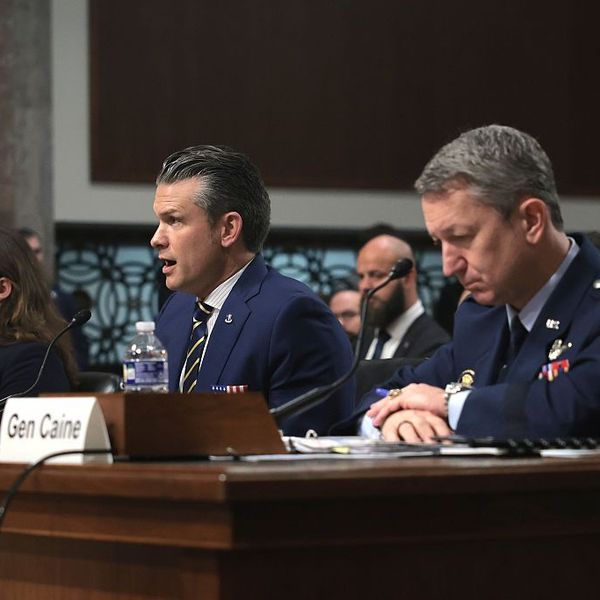
Human Rights Commissioner Zeid Ra'ad al-Hussein says Donald Trump's pro-torture views could spread to other world leaders. (Photo: UN Geneva/Flickr/cc)
Top U.N. Human Rights Official Denounces Trump's Pro-Torture Rhetoric
Commissioner expresses concern that Western leaders could flout human rights laws
A top human rights official for the United Nations is concerned that President Trump's pro-torture rhetoric could usher in a new era marked by the broad use of torture by world powers.
U.N. High Commissioner for Human Rights Zeid Ra'ad al-Hussein said this week that Trump's "persistent flirtation" with a return to torture could lead to the exploitation of tactics like waterboarding and other so-called enhanced interrogation techniques by governments.
President Trump said in January that waterboarding "absolutely works," echoing the support he expressed for the practice on the campaign trail. Waterboarding simulates drowning, was banned by President Barack Obama in 2009, and was officially condemned by 58 retired military generals and admirals in 2016.
Meanwhile, Americans are divided on torture. According to a Pew Research poll earlier this year, forty-eight percent say there are some circumstances in which torture is acceptable, while 49 percent say the practice has no place in US military operations.
The lack of a clear national stance against torture worries High Commissioner Zeid.
"Mindful of how the American public has, over the last 10 years, become far more accepting of torture," said Zeid, "the balance could be tipped in favor of its practice."
He noted that this could be especially plausible in the event of an attack on U.S. soil.
The U.N. Convention on Torture explicitly bans the use of torture by world governments.
"If other leaders start to follow the same rhetorical course, undermining the Convention with their words," Zeid said, "the practice of torture is likely to broaden, and that would be fatal."
Zeid pointed to recent comments by British Prime Minister Theresa May, who talked of flouting human rights laws in order to rid the United Kingdom of suspected terrorists. Following attacks in Manchester and London, May told reporters, "If human rights laws get in the way of doing these things, we will change those laws to make sure we can do them."
The High Commissioner called May's remarks "a gift from a major Western leader to every authoritarian figure around the world who shamelessly violates human rights under the pretext of fighting terrorism."
An Urgent Message From Our Co-Founder
Dear Common Dreams reader, The U.S. is on a fast track to authoritarianism like nothing I've ever seen. Meanwhile, corporate news outlets are utterly capitulating to Trump, twisting their coverage to avoid drawing his ire while lining up to stuff cash in his pockets. That's why I believe that Common Dreams is doing the best and most consequential reporting that we've ever done. Our small but mighty team is a progressive reporting powerhouse, covering the news every day that the corporate media never will. Our mission has always been simple: To inform. To inspire. And to ignite change for the common good. Now here's the key piece that I want all our readers to understand: None of this would be possible without your financial support. That's not just some fundraising cliche. It's the absolute and literal truth. We don't accept corporate advertising and never will. We don't have a paywall because we don't think people should be blocked from critical news based on their ability to pay. Everything we do is funded by the donations of readers like you. Will you donate now to help power the nonprofit, independent reporting of Common Dreams? Thank you for being a vital member of our community. Together, we can keep independent journalism alive when it’s needed most. - Craig Brown, Co-founder |
A top human rights official for the United Nations is concerned that President Trump's pro-torture rhetoric could usher in a new era marked by the broad use of torture by world powers.
U.N. High Commissioner for Human Rights Zeid Ra'ad al-Hussein said this week that Trump's "persistent flirtation" with a return to torture could lead to the exploitation of tactics like waterboarding and other so-called enhanced interrogation techniques by governments.
President Trump said in January that waterboarding "absolutely works," echoing the support he expressed for the practice on the campaign trail. Waterboarding simulates drowning, was banned by President Barack Obama in 2009, and was officially condemned by 58 retired military generals and admirals in 2016.
Meanwhile, Americans are divided on torture. According to a Pew Research poll earlier this year, forty-eight percent say there are some circumstances in which torture is acceptable, while 49 percent say the practice has no place in US military operations.
The lack of a clear national stance against torture worries High Commissioner Zeid.
"Mindful of how the American public has, over the last 10 years, become far more accepting of torture," said Zeid, "the balance could be tipped in favor of its practice."
He noted that this could be especially plausible in the event of an attack on U.S. soil.
The U.N. Convention on Torture explicitly bans the use of torture by world governments.
"If other leaders start to follow the same rhetorical course, undermining the Convention with their words," Zeid said, "the practice of torture is likely to broaden, and that would be fatal."
Zeid pointed to recent comments by British Prime Minister Theresa May, who talked of flouting human rights laws in order to rid the United Kingdom of suspected terrorists. Following attacks in Manchester and London, May told reporters, "If human rights laws get in the way of doing these things, we will change those laws to make sure we can do them."
The High Commissioner called May's remarks "a gift from a major Western leader to every authoritarian figure around the world who shamelessly violates human rights under the pretext of fighting terrorism."
A top human rights official for the United Nations is concerned that President Trump's pro-torture rhetoric could usher in a new era marked by the broad use of torture by world powers.
U.N. High Commissioner for Human Rights Zeid Ra'ad al-Hussein said this week that Trump's "persistent flirtation" with a return to torture could lead to the exploitation of tactics like waterboarding and other so-called enhanced interrogation techniques by governments.
President Trump said in January that waterboarding "absolutely works," echoing the support he expressed for the practice on the campaign trail. Waterboarding simulates drowning, was banned by President Barack Obama in 2009, and was officially condemned by 58 retired military generals and admirals in 2016.
Meanwhile, Americans are divided on torture. According to a Pew Research poll earlier this year, forty-eight percent say there are some circumstances in which torture is acceptable, while 49 percent say the practice has no place in US military operations.
The lack of a clear national stance against torture worries High Commissioner Zeid.
"Mindful of how the American public has, over the last 10 years, become far more accepting of torture," said Zeid, "the balance could be tipped in favor of its practice."
He noted that this could be especially plausible in the event of an attack on U.S. soil.
The U.N. Convention on Torture explicitly bans the use of torture by world governments.
"If other leaders start to follow the same rhetorical course, undermining the Convention with their words," Zeid said, "the practice of torture is likely to broaden, and that would be fatal."
Zeid pointed to recent comments by British Prime Minister Theresa May, who talked of flouting human rights laws in order to rid the United Kingdom of suspected terrorists. Following attacks in Manchester and London, May told reporters, "If human rights laws get in the way of doing these things, we will change those laws to make sure we can do them."
The High Commissioner called May's remarks "a gift from a major Western leader to every authoritarian figure around the world who shamelessly violates human rights under the pretext of fighting terrorism."

